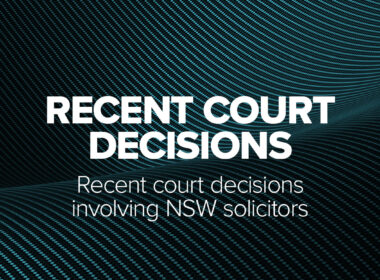A cost agreement is a formal agreement between a law practice and a client covering how the law practice will structure the costs of the work performed for the client.
Cost agreements, unlike cost disclosure, are not mandatory.
Reasons to have a cost agreement with your client
There are, however, good reasons to have one, including that:
- it serves as prima facie evidence that you provided adequate cost disclosure and that your costs are fair and reasonable (see s 172, particularly sub-s (4), of the Legal Profession Uniform Law (LPUL))
- you are likely to be afforded your contractual rights under it, as a cost agreement can be enforced the same way as any other contract (see s 184 of LPUL)
- it reduces the risk of arguments over who is liable to pay your fees
- it will likely enable you to charge interest on unpaid legal costs (see s 195(1) and (2) of LPUL)
- you can provide in the cost agreement that money you hold for your client in trust may be used as security for payments that become due
- having a cost agreement generally provides you with more certainty as to the arrangements for the payment of barristers’ fees.
Remember, under LPUL, a client has the right to a negotiated cost agreement (see s 174 2(a)(1)).
There are two types of cost agreements – standard cost agreements and conditional cost agreements. This article will focus on conditional cost agreements.
About conditional cost agreements
Provided the conditional cost agreement meets certain requirements, a law practice is permitted to enter into one with their clients. Having a conditional cost agreement means that the payment of some or all of the legal costs is conditional on the successful outcome of the matter to which those costs relate (see s 181(1) of LPUL). Such agreements are often referred to colloquially as ‘no win no fee’ types of arrangements.
Requirements of conditional cost agreements
The requirements for conditional cost agreements under LPUL are that they:
- be in writing and in plain English (s 181 (2)(a) of LPUL)
- set out the circumstances that constitute the successful outcome of the matter to which it relates (s181 (2)(b) of LPUL)
- be signed by the client (s 181 (3)(a) of LPUL)
- include a statement that the client has been informed of their right to seek independent legal advice before entering into the agreement (s 181 (3)(b) of LPUL)
- contain a cooling off period of not less than five clear business days, during which the client, by written notice, may terminate the agreement, but this requirement does not apply where the agreement is made between law practices only (s 181 (4) of LPUL).
Uplift fees
A conditional cost agreement may provide for the payment of an uplift fee (s 182(1) of LPUL) (excluding unpaid disbursements). An uplift fee is an additional amount under a cost agreement payable on the successful outcome of the matter which is the subject of the agreement. The uplift fee compensates the law practice for the risk in entering a conditional cost agreement.
Where a conditional cost agreement relates to a litigious matter, putting an uplift fee into the agreement is only permissible if the law practice has a reasonable belief that a successful outcome of the matter is reasonably likely and, even then, the uplift fee must not exceed 25% of the total legal costs (s 182(2) of LPUL).
The basis for calculating the uplift fee must be identified in the agreement (s 182(3)(a) of LPUL).
The agreement must contain an estimate of the uplift fee or, if that is not reasonably practical, a range of estimates, and an explanation of the major variables that may affect the calculation of the uplift fee (s 182(3)(b) of LPUL).
Defining successful outcomes
If you are putting together a conditional cost agreement, where payment under the agreement is conditional on “success” to the client, be sure to carefully define what a successful outcome might mean.
Examples of events that may constitute a successful outcome
Practitioners should take all reasonable care to ensure their client (or potential client) understands what a ‘successful outcome’ might look like.
For a personal injury claim, a successful outcome may mean money is payable to the client net of all liabilities including legal costs, arising out of the matter. However, what a successful outcome is will vary from matter to matter, depending ultimately on the resolution sought.
A successful outcome could, for example, include a judgment in the client’s favour, a settlement of the matter or, as contemplated in the below case, the winding up of a company.
Case of Musgrave v SRM Lawyers
Musgrave v SRM Lawyers Pty Ltd [2023] NSWDC 242 (Musgrave) considered the meaning of ‘successful outcome’. The case should be considered alongside s 181(2) of the LPUL.
Musgrave involved a dispute between the Executor of the late Mark Musgrave (the Plaintiff) and a law practice (the Defendant) who entered into a conditional cost agreement. The conditional cost agreement included the following term:
“The successful outcome of the matter, as agreed with you, is resolution of Federal Court Proceedings NSD1639/2018.”
The Plaintiff was a shareholder of WJN Investment Pty Ltd who had shares vested to him when the estate of the late Mark Musgrave became bankrupt.
The Plaintiff, as trustee of those shares, brought a claim against the company and its other shareholders that the affairs of WJN Pty Ltd were conducted in a way that was oppressive and unfair to the late Mark Musgrave and the trustee. The Federal Court dismissed the claim, and cross claim, with no orders as to costs. The costs review panel decided that the consensual dismissal of the claims constituted a resolution of the proceedings and consequently, the Defendant was entitled to payment of their legal costs.
The Plaintiff appealed on the basis that a successful resolution should only mean when there is a result and a flow of money to the trustee in bankruptcy.
The District Court agreed with the review panel in favour of the Defendant.
It found that, when the conditional cost agreement was entered into by the Plaintiff and Defendant, the parties contemplated there would be a spectrum of potential resolutions to the proceedings. These resolutions could significantly vary as to what might be considered successful and should not be limited to the payment of money to the trustee in bankruptcy.
Significantly, Newlinds SC DCJ said:
“… the parties were contemplating not just one outcome of the Federal Court proceedings but, if you like, a spectrum of potential resolutions, all of which might be described as successful. If the end result of the claim being brought by the trustee in bankruptcy at the time, was it produced a payment of $1 million, that would be obviously successful. So too might an outcome that produced $100,000, and so too might have been an outcome that produced no more than the winding up. After all, that was the only relief sought.
For the plaintiff, it is submitted that last alternative – that is, a plain winding up of the company – would not have constituted a successful outcome. That is because it is said that the proper construction of the condition is that the parties intended resolution to only mean a result of the case that resulted in a flow of money to the trustee in bankruptcy.”
His Honour determined that the Federal Court proceedings and its outcome which disposed of the claim, and cross claim, would be considered a resolution of the proceedings for the purpose of the conditional cost agreement. Accordingly, the Defendant should be entitled to the payment of its legal costs.
Musgrave buoys the position that what is a ‘successful outcome’ in conditional costs agreements may include a wide spectrum of circumstances.
The Professional Support Unit’s guidance, however, is that a law practice should nonetheless take care to be clear, specific and considered when determining what may constitute a “successful outcome” and communicate this clearly to the client to ensure that this is understood.
The NSW Law Society’s Costs Committee has prepared a pro-forma conditional cost agreement for solicitors, available on the Law Society’s website.
Readers wanting more information are encouraged to look at Chapter 3 of the Law Society’s Costs Guidebook.
The NSW Law Society’s Professional Support Unit provides free and confidential guidance to legal practitioners about their compliance, costs and ethical obligations under the Uniform Law.
Costs: costs@lawsociety.com.au or (02) 9926 0116
Ethics: ethics@lawsociety.com.au or (02) 9926 0114
Regulatory compliance: regulatory.compliance@lawsociety.com.au or (02) 9926 0115




